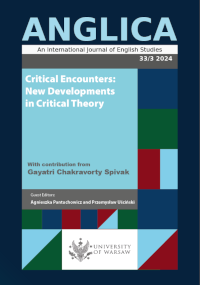Towards Symbiocene:
Simulation and Extrapolation
of Environmental Inevitability in Ecofiction
Towards Symbiocene:
Simulation and Extrapolation
of Environmental Inevitability in Ecofiction
Author(s): Pooja AgarwalSubject(s): Human Ecology, Sociology of Literature
Published by: Instytut Anglistyki Uniwersytetu Warszawskiego
Keywords: Anthropocentrism; ecofiction; Symbiocene; eco-consciousness; eco-guilt; ecological hope;
Summary/Abstract: Anthropogenic intervention into the environment has led us towards what isnow widely understood as a new epoch: the Anthropocene. While nature is a concrete andpalpable entity, the othering of it is a linguistic construct. Literary narratives are signifi-cant part of our everyday discourse and their efficacy in positing an alternative worldviewcannot be undermined. The current paper seeks to investigate select texts of ecofiction:Megan Hunter’s The End We Start from (2017), Jim Laughter’s Polar City Red (2012),Louis Lowry’s The Giver (1993), and Ernest Callenbach’s Ecotopia (1975), towards ana-lyzing how ecofiction can foster global eco-consciousness (Wallis 2013) by either in-stilling a sense of eco-guilt (Agoston et al. 2022) or offering ecological hope (Northcott2020). Towards that end, the paper shall trace out the genesis of ecofiction, and considerhow through the twin techniques of estrangement and extrapolation, it creates alternateworlds, thereby simulating future scenarios. These scenarios can offer apocalyptic visionsof dismal and tragic consequences of the human intervention into the environment, orcould posit a rejuvenating alteration in human efforts, resulting in increased environmen-tal imagination, leading us from Anthropocene towards the Symbiocene (Albrecht 2015).
Journal: ANGLICA - An International Journal of English Studies
- Issue Year: 33/2024
- Issue No: 3
- Page Range: 97-116
- Page Count: 20
- Language: English

